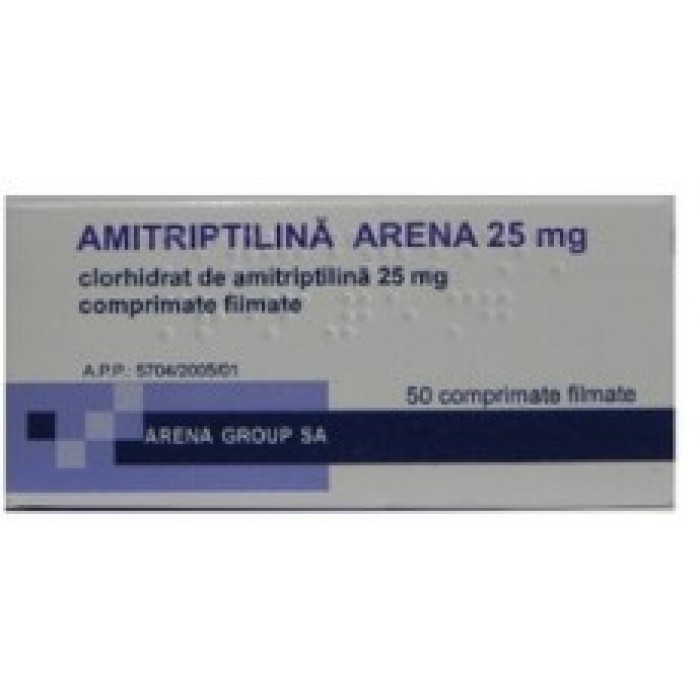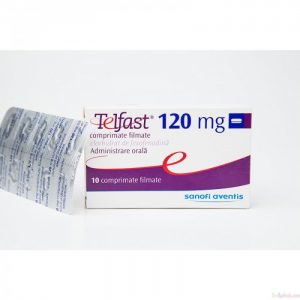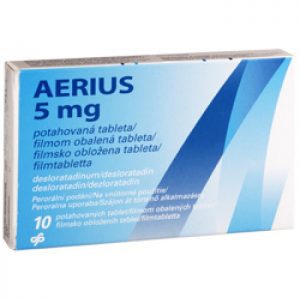Description
What Amitriptyline tablets are and what they are used for
Amitriptyline belongs to a group of medicines called tricyclic antidepressant drugs. These medicines alter the levels of chemicals in the brain to relieve the symptoms of depression. Amitriptyline is used: • to treat the symptoms of depression. • for the relief of bed-wetting at night by children. ORDER AMITRIPTILINA 25 MG
Before you take
Do not take Amitriptyline tablets and tell your doctor if you or your child (if they are the patient): • are allergic (hypersensitive) to amitriptyline, other tricyclic antidepressants or any of the other ingredients. The 25mg tablets contain sunset yellow (E110), which may cause allergic-type reactions including asthma. Allergy is more common in those people who are allergic to aspirin. • have heart disease such as irregular heart beats, heart block or failure, coronary artery disease or have recently had a heart attack • suffer from periods of increased and exaggerated behaviour (mania) • have severe liver disease • are taking monoamine oxidase inhibitors (MAOI) or you have taken MAOIs within the previous 14 days for depression • are breast-feeding • if the child is under 7 years old. Thoughts of suicide and worsening of your depression or anxiety disorder If you are depressed and/or have anxiety disorders you can sometimes have thoughts of harming or killing yourself. These may be increased when first starting antidepressants, since these medicines all take time to work, usually about two weeks but sometimes longer. You may be more likely to think like this: • If you have previously had thoughts about killing or harming yourself. • If you are a young adult. Information from clinical trials has shown an increased risk of suicidal behaviour in young adults (less than 25 years old) with psychiatric conditions who were treated with an antidepressant. If you have thoughts of harming or killing yourself at any time, contact your doctor or go to a hospital straight away. You may find it helpful to tell a relative or close friend that you are depressed or have an anxiety disorder, and ask them to read this leaflet. You might ask them to tell you if they think your depression or anxiety is getting worse, or if they are worried about changes in your behaviour. Check with your doctor or pharmacist before taking Amitriptyline tablets if you or your child (if they are the patient): • have any blood disorders (you may bruise easily, frequently suffer from infections or be anaemic) • have any psychiatric disorder (eg schizophrenia or manic depression) • have liver or cardiovascular disease • are not able to pass water or have an enlarged prostate gland • have an overactive thyroid gland and are taking medicines to treat a thyroid disorder • have a history of epilepsy • are being given electroconvulsive therapy (ECT) • have increased pressure in the eye (glaucoma) • are due to have any surgery, including dental, that involves an anaesthetic.
Taking other medicines
Please tell your doctor or pharmacist if you are taking or have recently taken any other medicines, including medicines obtained without a prescription. Especially: • altretamine (to treat some types of cancer) • apraclonidine and brimonidine (to treat glaucoma) • baclofen (a muscle relaxant) • disulfiram (to treat alcohol addiction) • painkillers such as nefopam, tramadol, codeine, dihydrocodeine • medicines to treat some heart conditions such as amiodarone, diltiazem, disopyramide, procainamide, propafenone, quinidine, sotalol, verapamil • medicines to treat angina that you spray or dissolve under your tongue (eg glyceryl trinitrate “GTN”, isosorbide dinitrate) • rifampicin or linezolid (to treat infections) • carbamazepine or phenobarbital (to treat epilepsy) • terfenadine (to treat allergies or hayfever) • methylphenidate (to treat attention deficit/hyperactivity disorder (ADHD)) • any medicines to treat high blood pressure such as guanethidine, debrisoquine, bethanidine or clonidine or diuretics (“water” tablets) • medicines to treat some mental illnesses such as clozapine, pimozide, thioridazine chlorpromazine, haloperidol, prochlorperazine, sulpiride • cimetidine (to treat ulcers) • ethchlorvynol (to help you sleep) • entacapone or selegiline (to treat Parkinson’s disease) • oral contraceptives (“the pill”) • sibutramine (to suppress appetite) • sympathomimetic medicines such as adrenaline (epinephrine), ephedrine, isoprenaline, noradrenaline (norepinephrine), phenylephrine and phenylpropanolamine (these may be present in many cough and cold remedies) • ritonavir (to treat HIV) • fluconazole (to treat fungal infections)
Pregnancy and breast-feeding
Amitriptyline tablets should not be taken in the first 3 months and last 3 months of pregnancy. If taken in the last three months, the newborn may have withdrawal symptoms. Do not take Amitriptyline tablets if you are breast-feeding.
Driving and using machines
Amitriptyline may impair your alertness. Make sure you are not affected before you drive or operate machinery.
Important information about some of the ingredients
If you have been told you have an intolerance to some sugars, contact your doctor before taking this medicine, as it contains a type of sugar called lactose. The 25mg tablets also contain a colour called ‘sunset yellow’ which may cause allergic reactions.
How to take
Always take Amitriptyline tablets exactly as your doctor has told you. If you are not sure, check with your doctor or pharmacist. Swallow the tablets with a glass of water. You are advised not to drink alcohol with this medicine. You may not notice any improvement in your symptoms for up to 4 weeks after starting treatment.
If you take more than you should
If you or the patient (or someone else) swallow a lot of tablets at the same time, or you think a child may have swallowed any, contact your nearest hospital casualty department or tell your doctor immediately. Symptoms of an overdose include fast regular heart beat, dilated pupils, drowsiness, coma, difficulty breathing, jerky movements, hot dry skin, dry mouth and tongue, difficulty passing water, intestinal blockage, uncontrolled eye movement.
If you forget to take the tablets Do not take a double dose to make up for a forgotten dose. If you forget to take a dose, take another as soon as you remember and then your next dose at the usual time.
If you stop taking the tablets
Talk to your doctor before you stop taking the tablets and follow their advice as you may experience withdrawal symptoms.
Possible side effects
Like all medicines, Amitriptyline tablets can cause side effects, although not everybody gets them. Stop taking Amitriptyline tablets and contact your doctor at once if you experience the following: allergic reaction, a skin rash, which may be itchy, sensitivity to the sun or sun lamps, puffy, swollen face or tongue, which may be severe causing shortness of breath, swelling, shock and collapse. Tell your doctor if you notice any of the following side effects or notice any other effects not listed: Blood: bone marrow depression or reduction in some blood cells (you may experience a sore throat, mouth ulcers and recurring infections, bleeding or bruising easily) Endocrine system and metabolism: disturbances in sexual function or sex drive, breast swelling in men and women, swelling of the testicles, production or over-production of breast milk, changes in blood sugar levels, increased appetite and weight gain. Inappropriate secretion of the hormone ADH (antidiuretic hormone), which may make you urinate more frequently Brain and central nervous system: dizziness, tiredness or sleepiness, weakness, headache, difficulty concentrating, confusion, difficulty sleeping, nightmares, slight hyperactivity, exaggerated behaviour, delusions, seeing things that are not there, anxiety, excitement, disorientation (not knowing where you are), restlessness, pins and needles, lack of co-ordination, shaky movements, tremor, fits. Anticholinergic effects (dry mouth, fever, constipation, blurred or double vision, difficulty passing water (urine), dilation of the pupil of the eye, glaucoma and blockage of the small intestine) Heart: feeling faint when getting up (postural hypotension), increased blood pressure, fast/racing heart, palpitations, heart attack, stroke, irregular or slow heart-beats and very low blood pressure Stomach and intestines: feeling or being sick, diarrhoea, loss of appetite, inflammation of the mucus membranes in the mouth, swollen saliva glands, abdominal pains, black tongue, impairment of taste Liver: hepatitis, including changes in liver function (as seen in blood tests), jaundice (yellowing of the skin and/or whites of the eyes) Other: increased sweating, hair loss, ringing in the ears, increased need to urinate. An increased risk of bone factures has been observed in patients taking this type of medicine. Withdrawal symptoms: feeling sick, malaise and headache, dream and sleep disturbances, irritability and restlessness. Mania or hypomania (exaggerated mood and/or elation) may occur 2-7 days after stopping the tablets. If taken to treat bed-wetting: drowsiness, mild sweating, itching, changes in behaviour and “Anticholinergic effects” (as described above). Tell your doctor if you notice any of the above side effects or any other effects not listed:
How to store
Keep out of the reach and sight of children. Store below 25°C in a dry place, protected from light. Do not use Amitriptyline tablets after the expiry date stated on the label/carton/bottle. The expiry date refers to the last day of that month. Return any unused medicines to your pharmacist for safe disposal.
Amitriptilina is also known as Amitriptyline, which is its generic name. This is a medication that is meant to help people battling clinical depression. It is so strong that it is not generally given to patients who are experiencing a milder form of depression. There are other treatment uses for it also, including the treatment of chronic pain. Amitriptilina has been an approved medication since 1961 when the FDA declared it to be safe to prescribe to people who need it.
This medication has been tested when it comes to treating patients with conditions such as insomnia, eating disorders, chronic coughing, incontinence, interstitial cystitis and Attention Deficit Disorder. It has been used as either a substitute for other common types of ADD medication or in addition to other ADD medications.
Many people avoid taking Amitriptilina because of the number of adverse effects it has on those who take it. These effects include dizziness, weight gain, headache, impotence, libido suppression, tremor, sweating, agitation, insomnia, confusion and anxiety. There are some less common side effects of taking this medication as well, including nausea, arrhythmias, mania and hypomania, skin allergy reactions, and breast enlargement in both men and women. Side effects that patients can, but rarely see as a result of taking Amitriptilina include hypertension, failure of the liver, hepatitis, hypotension, heart palpitations, stroke, heart attack, heart block and fainting. There are also some side effects to taking this medication where it is unknown how often they might occur, such as seizures, delusions, tingling, numbness, weakness, swelling of testicles, incoordination, frequent urination, a black tongue, coma, tinnitus, ataxia and an increase in perspiration.
Some people are not able to take this medication safely. This includes anyone under the age of seven, those who are breast feeding, suffering from liver disease and patients with a history of heart blockage, myocardial infarction and a hypersensitivity to any similar types of antidepressant medication.
This is a carefully controlled substance due to the fact that an overdose of it could cause minor as well as major health problems. The more minor problems than can arise from overdosing on Amitriptilina include drowsiness and vomiting. Some of the more major problems that can arise include coma, convulsions, severely low blood pressure, hypothermia, a dangerously high heart rate and electrocardiogram changes.
Anyone who finds thy have overdosed on Amitriptilina can try ingesting charcoal within an hour or two after the overdose occurs. In more serious cases, for example, if the person who overdosed has lost consciousness, charcoal can be ingested by inserting a nasograstic tube to send the charcoal into their stomach.
Amitriptilina is always sold under many different brand names and must be prescribed by a licensed doctor. ORDER AMITRIPTILINA 25 MG





Reviews
There are no reviews yet.